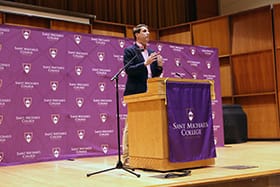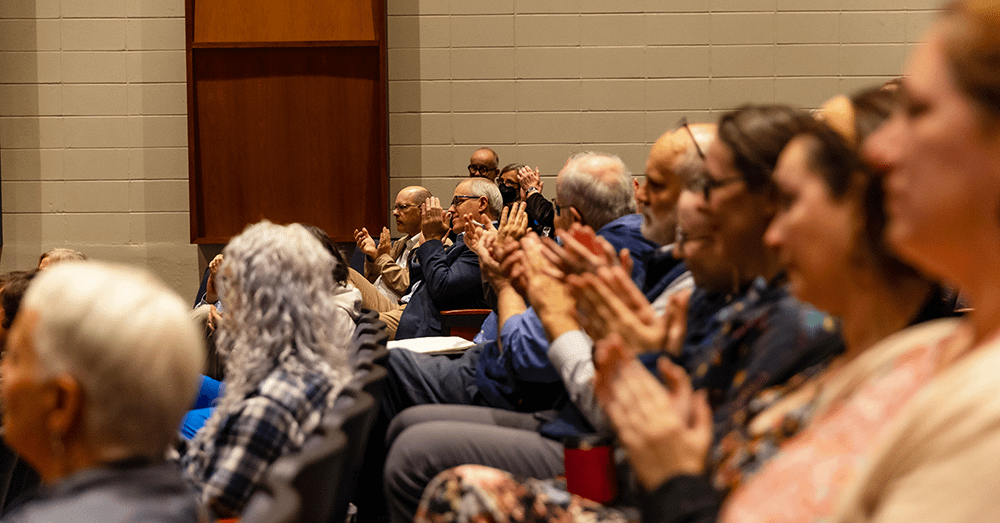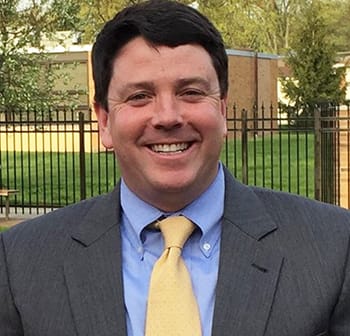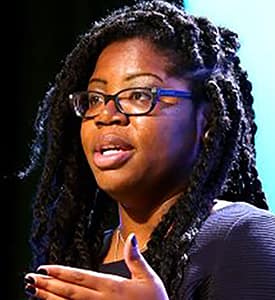Journalist outlines Mueller investigation

Garrett Graff addresses a group of students, faculty and community members at the McCarthy Arts Center on Tuesday, Sept. 18.
Acclaimed author and journalist Garrett Graff spoke to a gathered group of students, faculty, staff and community members on Tuesday, Sept. 18, at the McCarthy Arts Center about Robert Mueller, the investigation of Russian Election interference and his thoughts on what will happen next with the search into the 2016 election.
“One of the things that stands out for me in this investigation is you don’t see, in this case, innocent explanations,” Graff said of his research into the Russian investigation. “Every single twist of this story ends up being weirder than the first reporting on it, which is the opposite of the way reporting usually goes.”
Hosted by Psi Rho, the Saint Michael’s College chapter of Pi Sigma Alpha, the National Political Science Honors Society, the talk spanned many points about Mueller and his investigation.
Graff, a former editor of Washingtonian magazine and POLITICO, walked the audience through Mueller’s history, from his enlistment in the Marines, to his service in Vietnam and his career with the Federal Bureau of Investigations.
Mueller, who graduated from Princeton University in 1966, joined the Marine Corps in 1968 and attended Officer Candidate School, the Army Ranger program and the Army jump program. He served in the Vietnam War – in the thickest fighting of the war, according to Graff – and earned a Bronze Star for his distinguished service.
Graff, who met and interviewed Mueller in 2008, continued with the history, describing the former FBI director’s life of public service. He served in the Department of Justice, as an assistant attorney general and became head of the FBI in 2001.
Graff also mentioned a particular fight over the legality of a surveillance program, in which the acting attorney general, James Comey, brought Mueller into the situation because of how respected the FBI director is.
“I was able to ask Jim Comey [why Mueller was brought in] and his answer was ‘He knew that no one would question Bob Mueller’s integrity and he knew that no one would question Mueller’s partisanship or politicization’,” Graff said. “If Bob Mueller said the program was wrong, the program was wrong.”
Graff’s outline of Mueller’s history drew a picture of a man whose integrity was never questioned in his years of public service and who had the complete trust of the five U.S. presidents that he served under.
Graff then discussed Mueller’s post-FBI career, which involved investigating private companies including the National Football League’s handling of the Ray Rice incident.
“The way that Bob Mueller has done and led these investigations his entire life, with this incredible level of tenaciousness, of thoroughness,” Graff said. “That’s really what we can see in the way that the investigation has unfolded since May of last year.”
After outlining Mueller’s credentials, Graff then turned to the current investigation into Russian interference in the U.S. election in 2016. Graff, who has written about both Mueller and the Russian hacking investigation for WIRED magazine, began his dissection of the current standing of the investigation by saying “tonight we know the least about his investigation and where it is headed and where it is ultimately going to end up then we have in perhaps the entirety of the investigation.”
Graff then outlined the pillars of the investigation – from money laundering in past business schemes, Russian attacks on the election to sketchy contacts with the Russian government — outlining obstruction of justice and campaign finance violations.
Talking about indictments and plea deals – including the recent plea deal with Paul Manafort which is providing the public with the current murkiness surrounding the investigation – Graff outlined where he thinks each part of the investigation is and how he thinks it is all connected to the people in the Trump Administration and the president himself.
“I have been talking and writing about this case since the election of 2016,” Graff said. “I have somewhat given up on predicting where it is going to go.”
Graff discussed the two Russian attacks on the election, from the direct attacks on the Democratic National Party and the email hacks to the influence on social media by Russia’s Internet Research Agency, which have already led to indictments.
Graff then discussed the trials and indictments of Paul Manafort, Michael Cohen and Michael Flynn and how those affect the different areas of the investigation.
After Graff’s outlining of both Mueller’s history and where we are with the Russian Investigation, the audience was left with a thorough outlook on what Mueller has accomplished in the time he has already had, how much of past criminal activity is already written into the public record — and with a lot of questions about where exactly this is all going.





